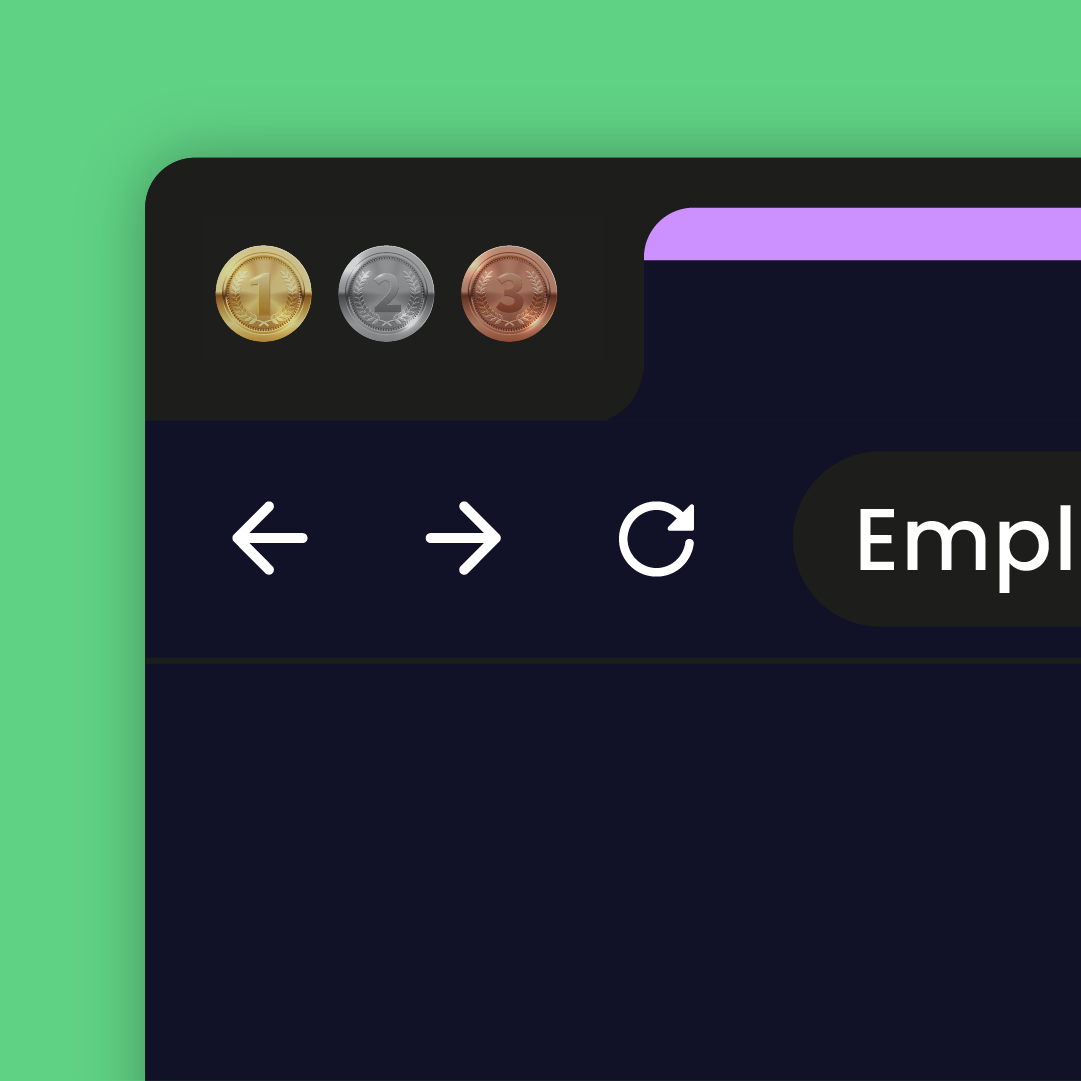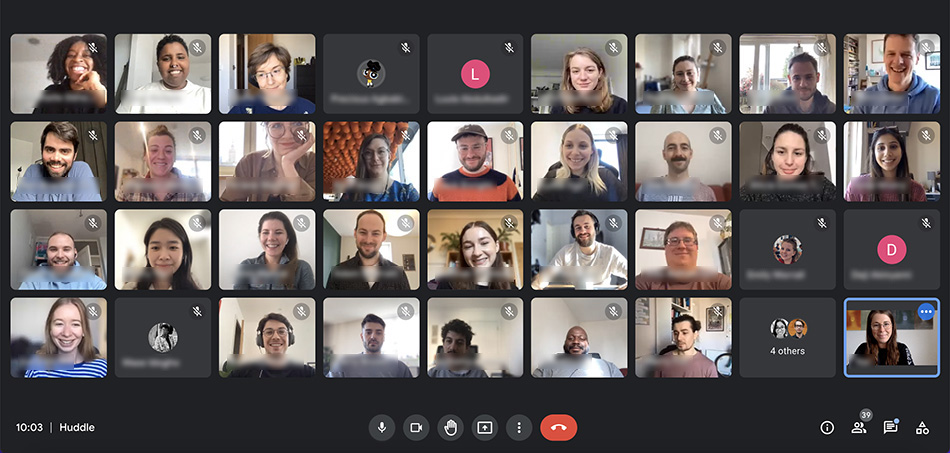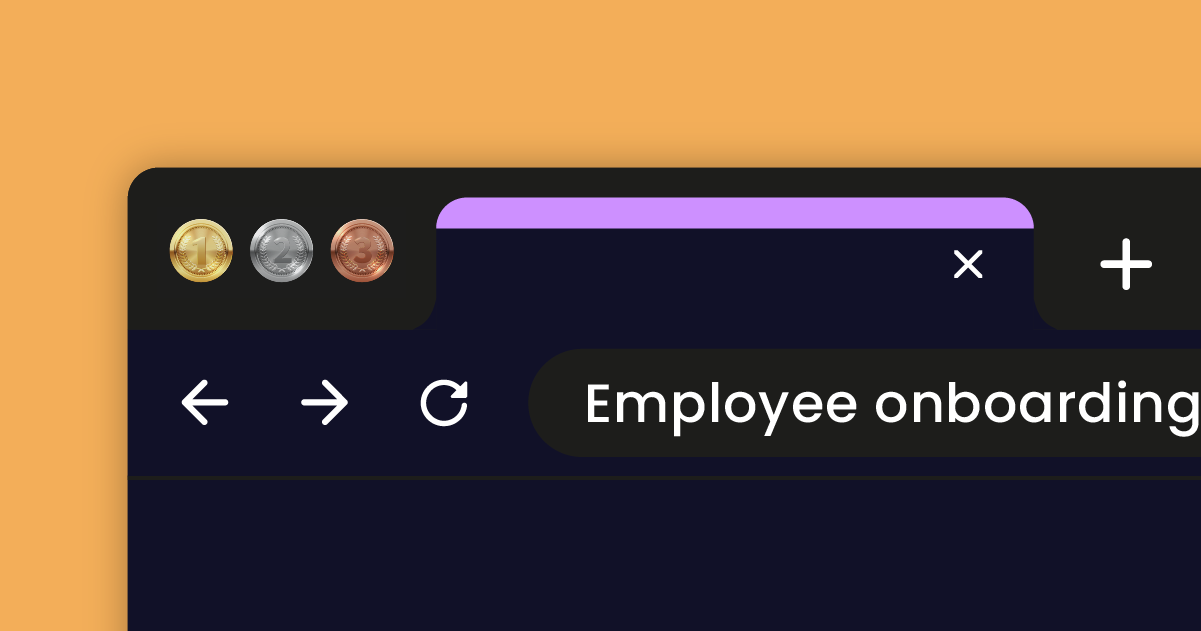
Onboarding is sacred. At least, that’s what I’ve learnt over my years running a small business like Charlie.
But what makes onboarding a great experience for your new hires?
To find out, I asked some of my peers to join the discussion and give you some tips on how to build the best onboarding experience for your team.
In this blog, you’ll read all about what a good onboarding experience looks like at CharlieHR and at 4 small businesses and startups.
Best onboarding experience #1
Best for: the most welcoming team out there
At Charlie, I learnt soon enough that hiring doesn’t always go according to plan, but rather than blaming the new hire, I had to ask myself: what do we need to make them succeed?
As an HR software company, we quickly realised that there were a lot of different factors involved in building a great onboarding experience:
- Make it easy for new joiners to pick up the pace
- Ensure new employees are at ease with their coworkers
- Effortlessly find answers to their questions
- Set clear expectations for their role
- Ask what they may need from our business to succeed
If we didn’t lay the groundwork for new hires to thrive, we were probably setting them up for failure – that’s why having a solid onboarding process was crucial for us.
What’s it like for new employees at Charlie?
We want clear communication from all sides, and new employees can expect:
-
Aligning expectations from both sides – we’re transparent about the kind of results we expect from the new hire at certain points in time, and the new hire tells us what they need to make this a reality
- Sharing valuable context – we share the right amount of context to allow the new hire to get up to speed and contribute to the work their team is doing without overwhelming them
- Communicating ways of working – we make sure the new hire is clear about what working for Charlie looks like in practice and in values
There’s a clear process in place and easy steps to follow when you onboard with Charlie. We summarised some of it below through an onboarding checklist that you can copy and repurpose for your business:
Before the new hires starts
- Send their contract and get it returned and signed
- Invite new hire to CharlieHR’s platform to complete the onboarding process automatically
- Get new hire to upload passport and P45 directly onto Charlie
- Give them access to HR policies and processes in our company playbook (stored in our HR platform)
- Write a welcome email and introduce new hire to everyone before their first day
- Keep in touch and ask new hire whether they need any equipment apart from their laptop
New hire’s first day
- Schedule a meeting to give them context on systems, logins and meetings – this is usually online as a lot of our team go through a remote onboarding process
- Give them a warm welcome in a company-wide meeting
- Ask them to go through the checklist assigned to them in our software – they can just tick off boxes as they go along (this checklist can be templatised)
- Get new hires to read essential documents regarding business strategy, product roadmap, general information
- Have a 15-min check in and wrap up call at the end of the day
Day 2
- Meet with new hire again and walk through a personalised onboarding plan that their manager will have filled in as you can see below
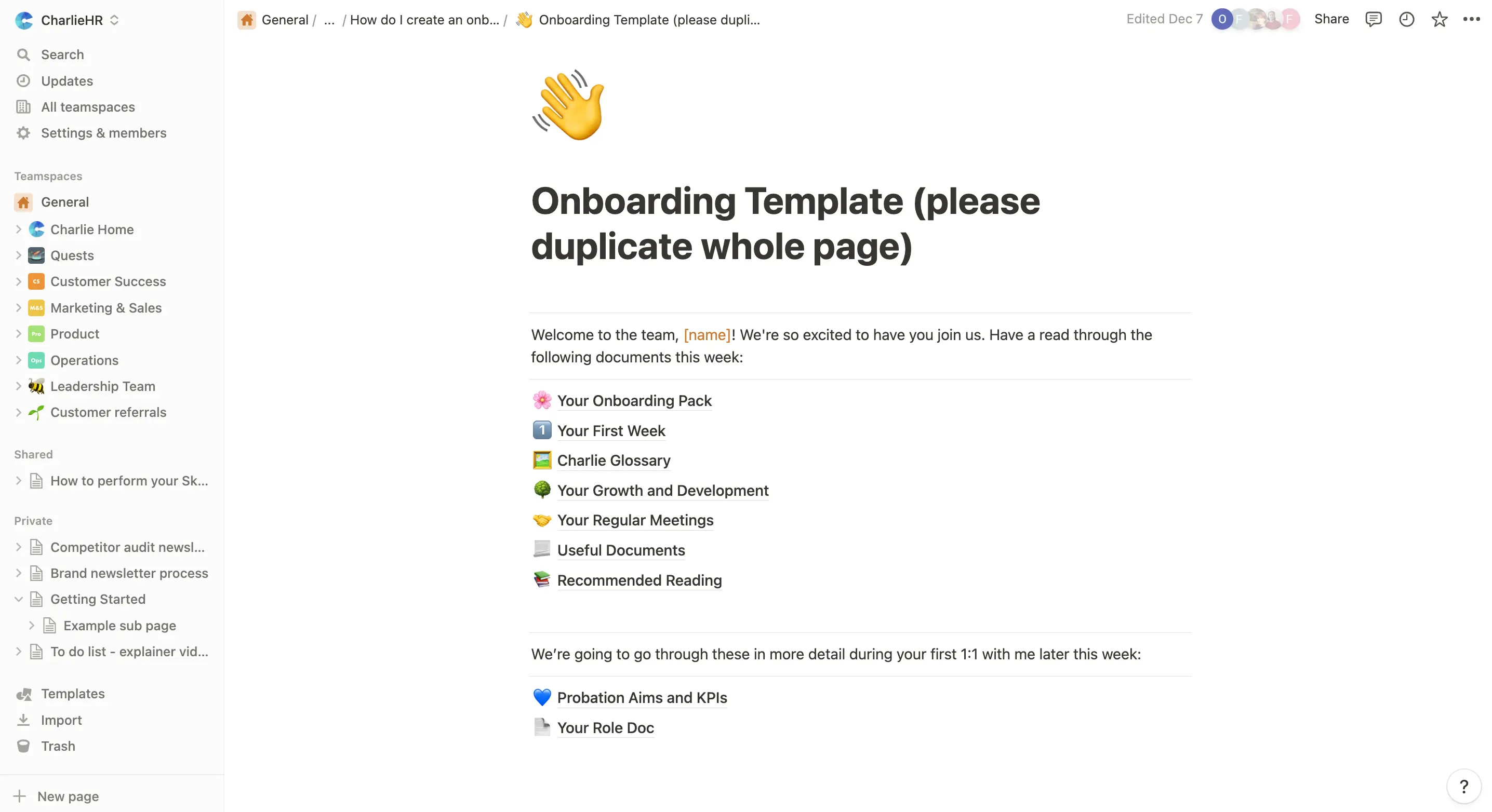
Day 3
- Get the new hire familiar with their role document and probation plan as well as any KPI or objectives they need to work towards
- Ask them to complete a Manual of me – a way to help other team members understand how the new starter works best
End of first week
- Have a chat at the end of the day to check if they have feedback and tell them what’s happening the week after
Week 2
- It should be focussed on training new hires onto function-specific skills and processes, while also starting to give them small projects to own and add value to
- Set goals for the rest of their onboarding until the probation period ends
Of course, this isn’t all there is to it, but we thought it’d be better if you read our onboarding process steps written by our People and Talent manager Finola to find out more about what our onboarding looks like.
The other thing that sets us apart is how we’ll conduct a full assessment against our progression framework before deciding whether new hires pass, fail or get their probation extended to make sure the process is as fair as possible.
What makes Charlie the best onboarding experience?
Our team is one of the most welcoming out there, and that really makes a difference to new hires. We pride ourselves on having built a group of people with humane and approachable qualities – everyone will reach out to say hi, book time in the new hire’s calendar, and make sure they introduce themselves for a good first impression.
Giulia T. – Content Marketing Manager
“I’ve never been so impressed with an onboarding experience before – this was all I ever asked for: the onboarding team was concise, clear and always available for questions, giving me enough autonomy to explore things myself. 10/10”
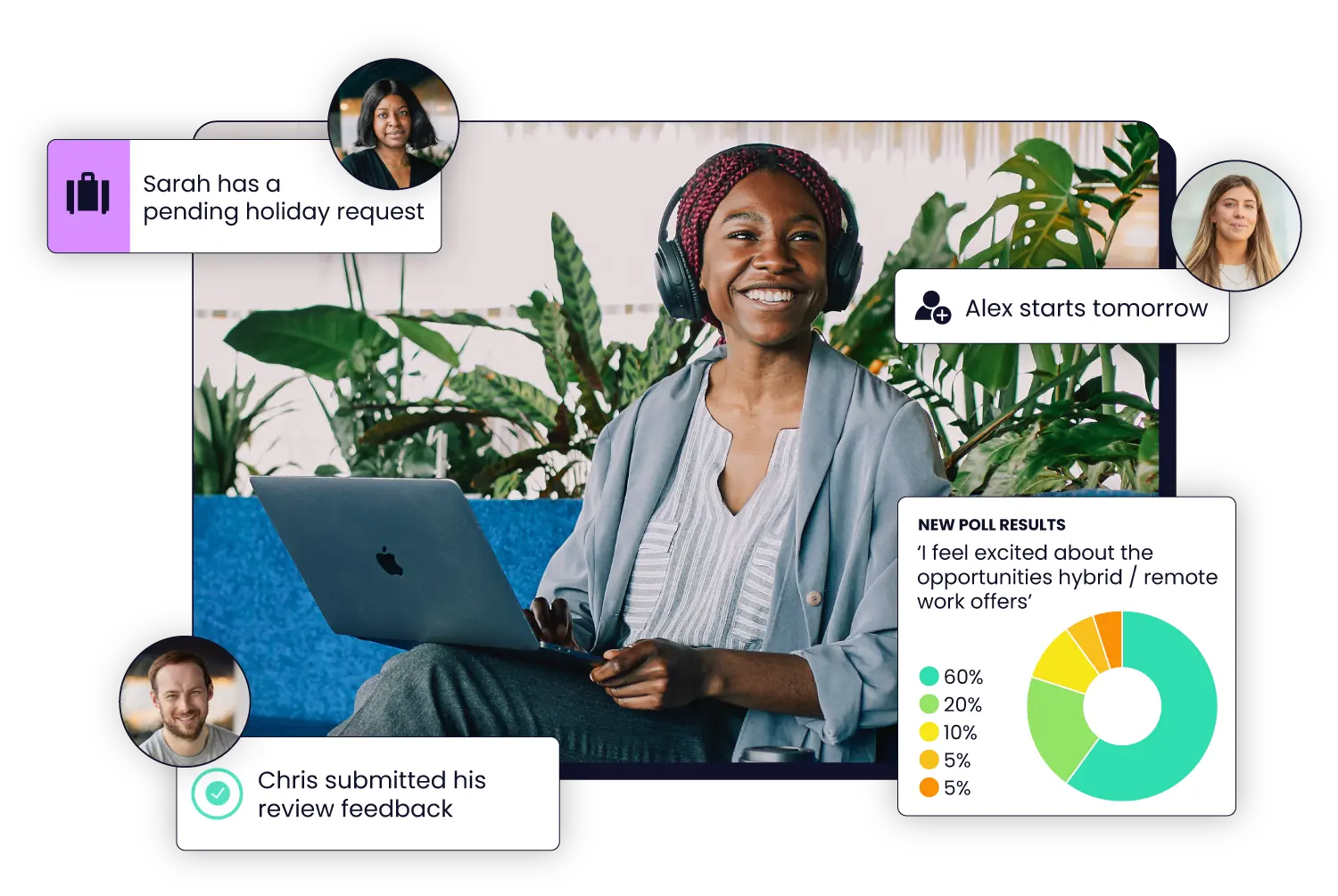
Try Charlie for free
Save yourself hours every week – and spend it building a happy, high-performing team instead

Free for 7 days

No credit card needed

Cancel any time
Best onboarding experience #2
Best for: onboarding made for empowering people
eduMe is the training platform of choice for the frontline, giving everyone the opportunity to be successful at work.
This mission is complementary to the way they approach onboarding within their own ranks. Marnie Richards, Head of People at the business, shared with me some of what makes eduMe one of the best employee onboarding experiences out there.
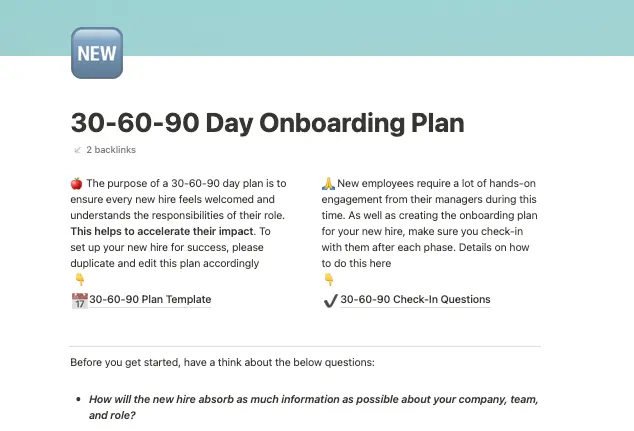
What’s the onboarding experience like at EduMe?
It’s all about striving to create a positive and inclusive experience for potential new joiners throughout the entire employee lifecycle.
That means onboarding doesn’t just stop at day one but instead carries on towards the growth and development of the business.
From the moment the offer is accepted, eduMe strives to make new joiners feel welcome by:
- Sending new hires swag gift boxes with a handwritten note
- Inviting them to company events happening in the lead up to their start date
Marnie Richards – Head of People at eduMe
“We have an all-hands once a month, a hackathon every 6 months, and each department has a quarterly social event - so there’s always something to invite new hires to before their first day. We even invited four new joiners to Tuscany last year!”
Employee experience managers keeps in constant communication with new joiners before their start date, ensuring all of the practical steps like equipment and accounts are set up before their first day.
This allows new employees to focus on the essential things once they’ve joined. There’s also a £500 working-from-home budget available for all employees, to ensure that every joiner can work comfortably whether they’re at home or in the office.
All new joiners then get introductory meetings with Heads of Departments and our CEO – they get to know everyone and have a more in-depth understanding of the company, its values and its future.
After the initial onboarding phase, we have a robust 30-60-90 day plan and template for all of our new joiners:
- The first 30 days – the discovery phase is when the new hire learns as much as possible about company policies, team structure and job responsibilities whilst working on tasks and projects given by their manager
- The next 30 days – the ownership phase is the new hire’s opportunity to put what they’ve learned into action by taking on chunkier tasks. This is a key learning period, whilst giving room for error and growth
- The third month of employment – the growth phase is when the new hire has begun mastering the skills of their job which means they can start tackling the goals outlined in their onboarding
New hire at eduMe
“The onboarding process here is like no other I've experienced. The employee experience and talent team do a great job at making any newcomer feel like they are instantly part of the eduMe team. I was very impressed, and continue to be amazed at how much care the org has for its employees. Love it!”
What makes eduMe the best onboarding experience?
A people-first company - this belief filters from the top down, and the People team are empowered to go above and beyond.
Best onboarding experience #3
Best for: hands-on onboarding
Built to help managers set up what progression looks like for their team, Progression has high standards in every area of the business, including their own onboarding process.
I got in touch with Jonny Burch, Founder and CEO of Progression and Neil Cameron, co-founder and CTO, to discuss what the best employee onboarding process looked like for them.
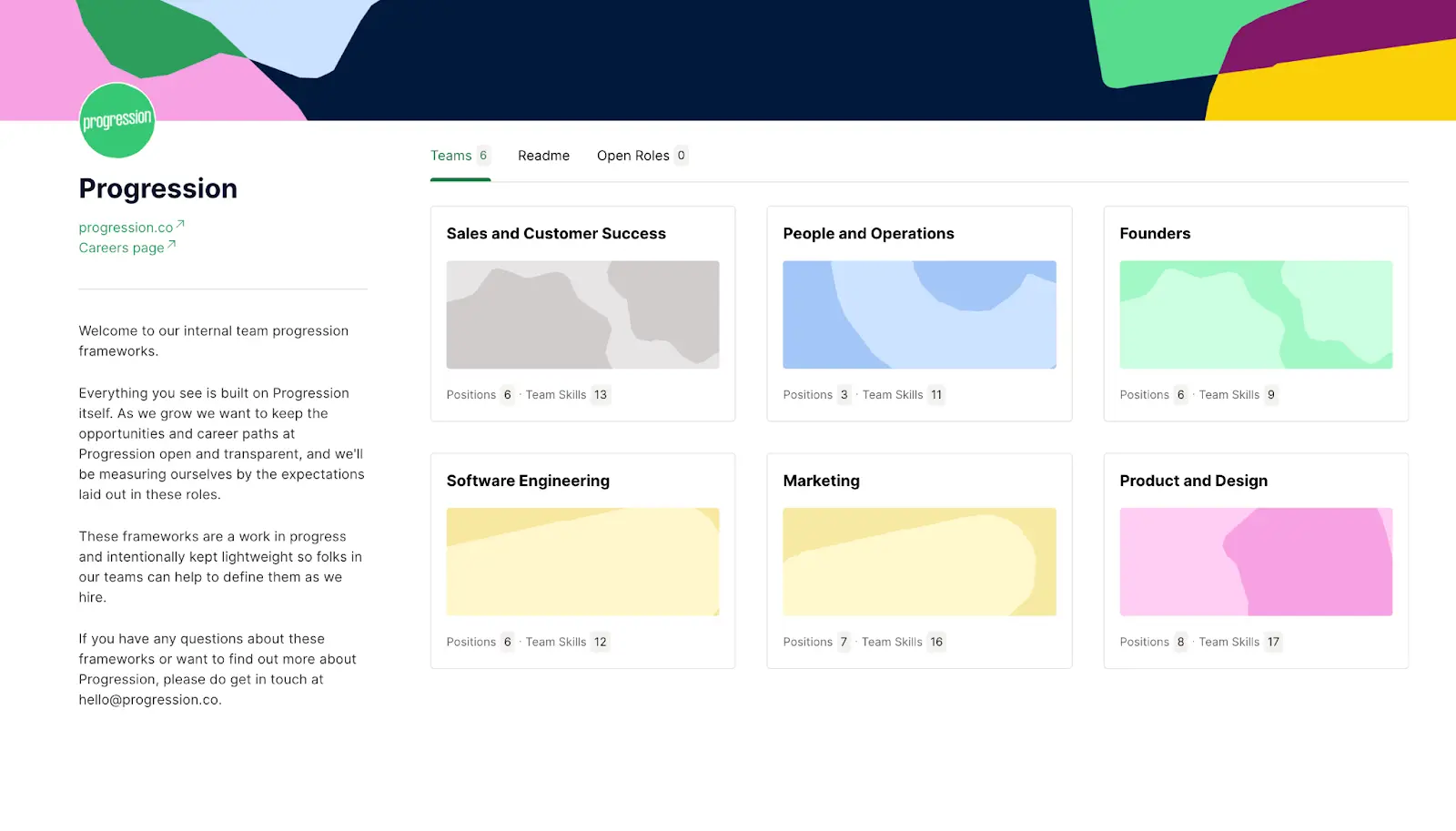
What’s the onboarding experience like at Progression?
Simply enough, it starts with a Notion template – it can seem very basic, but it’s super helpful to understand how the onboarding process is going to be split up for new hires.
Let’s take a look at what this plan is made of:
-
4 weeks before the new hire starts – the process starts by simply getting new employees in the HR system and ensuring documentation is in order and equipment has been sent. Progression then sends some goodies to the new hire so they feel welcome and familiar with the business
-
2 weeks before the new hire starts – do the rest of the admin by requesting the P45 and onboarding them onto payroll
-
1 week before – sending instructions for their first day, adding them to all relevant platforms and announcing their starting day on Slack
-
First day – this is a crucial day for the new hire, so it’s important the line manager does a welcome call in the morning and runs them through what will happen in their first week along with passing them all the information they need
-
First week – there’s a required list of readings to go through as well as 1-to-1s with every member of the team. The new hire gets acquainted with the product, the company and the strategy
-
Two weeks in – that’s where we clarify what’s expected until the end of probation and set goals for 30, 60 and 90 days
It might look like too much, but it’s never good to leave new hires alone as it can be counterproductive – they won’t know what’s expected of them.
As a remote-first team, Progression focuses on building a relationship with new hires. In practice, that means:
- Keeping in touch with their manager through regular 1-to-1s
- Getting new hires to schedule calls with the whole team to get to know each other (having the new hire make the first step rather than just passively sit through calls)
- Gathering feedback to understand where the experience can be improved
What makes Progression the best employee onboarding experience?
An early-stage startup where onboarding is still handled by co-founders – it gives a level of closeness to the business you don't often get.
With Progression, candidates also get access to progression frameworks at team.progressionapp.com - it gives them a good idea of what’s expected in the role, as well as what the potential career path looks like before they apply.
New hire at Progression
“I found the onboarding process very straightforward. Having checklists in place is a great idea as it’s very easy to miss onboarding elements in the long run.”
Best onboarding experience #4
Best for: ownership and flexibility
Clear, simple, and human. That’s how Megan Murphy, co-founder & CEO, describes the onboarding process they’re aiming for at Ourspace, a team design platform that equips tech leaders to make smarter org structure decisions.

What steps make up the onboarding experience at Ourspace?
Before each new joiner starts, they first get a choice on equipment preferences so they get what they need from the business.
Once that’s ticked off, they’re given access to a Trello board for onboarding that includes:
- Key information about the business such as origin story, a timeline of how and why Ourspace started, company values, brand attributes and product principles
- An introduction to each teammate
- Strategy documents and product roadmap
- A plan for their first week
- Operational assets such as logins, ways of workings, compensation principles, and expenses
- A glossary of internal jargon
That’s the starting point of each new hire, but that’s not all they get. They also participate in a series of onboarding rituals specific to Ourspace. During their first four weeks, they end each Friday with a team-wide presentation:
- Week 1: Presenting a topic of their choice using the Pechakucha style
- Week 2: Sharing their core values
- Week 3: Reflecting on how their role meets their expectations
- Week 4: Sharing any feedback on the onboarding process and what improvements they may suggest
What makes OurSpace the best employee onboarding experience?
We opt in for employee ownership and flexibility. In everything related to how people work, we try to provide as much freedom and autonomy as possible. This includes a €1,000 home office setup for each new joiner to ensure that their workspace equips them to work as productively as possible.
Laura Agudelo – Founding Designer
“My onboarding experience was well balanced and set expectations for my journey at Ourspace. I got a mix of small operational wins, exposure to customers, fun ways to get to know the team, and big-picture context. It was nice to not feel too overwhelmed with to-dos while also getting a clear direction.”
Best onboarding experience #5
Best for: ownership and flexibility
Having worked with FairHQ ourselves, we know how important Diversity, Equality and Inclusivity are for businesses.
Speaking to Kate Pljaskovova, CEO & Founder at FairHQ – a platform designed to help companies with their DE&I strategy – gave me a clear view of how this can be done right from the start.
Let’s see what that looks like from the inside.
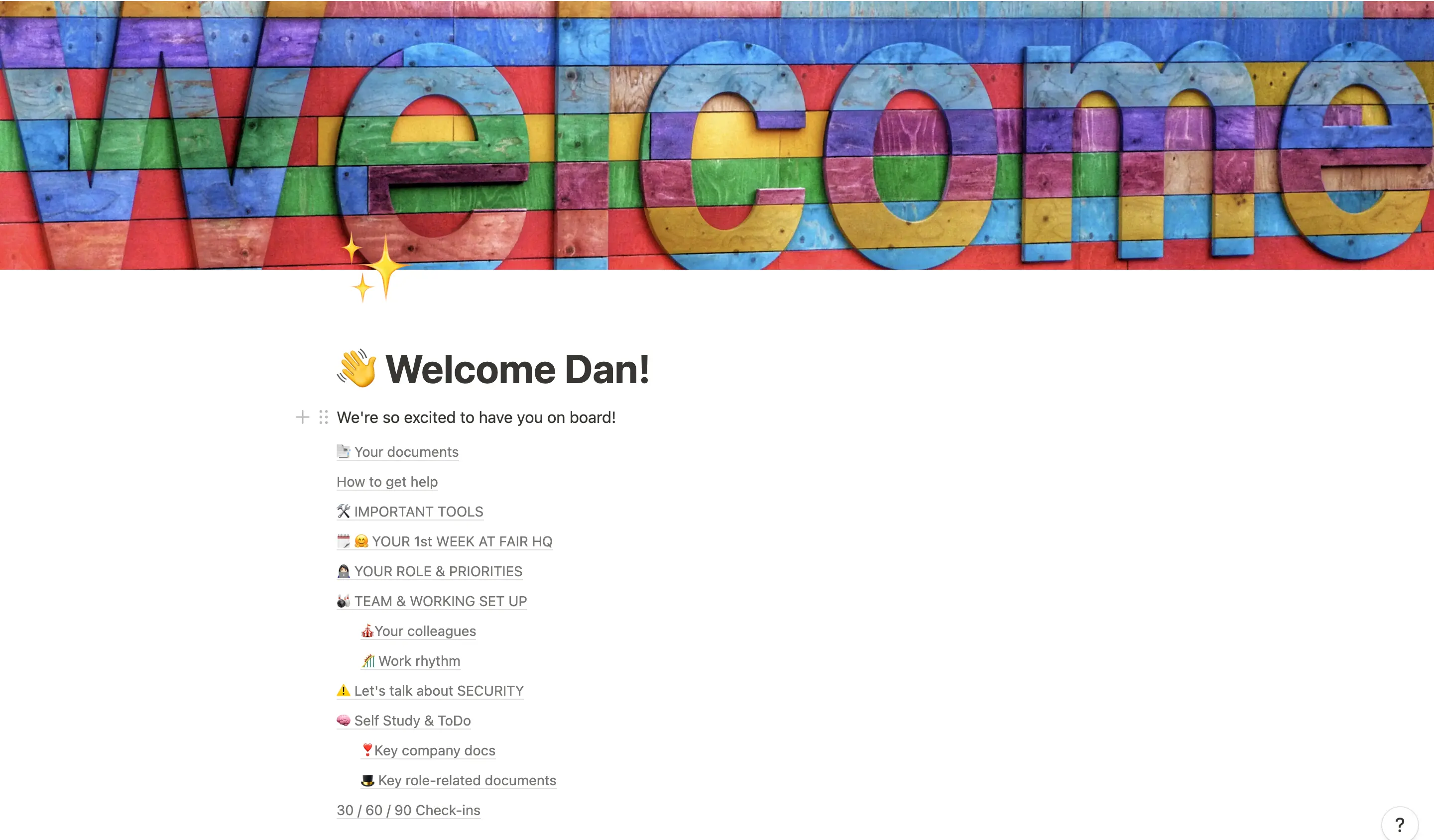
What is it like to onboard as a new team member at FairHQ?
Onboarding doesn’t start from day one, but way before that. FairHQ likes to think of onboarding as straight after the offer has been accepted.
That doesn’t mean they’ll overwhelm the new hire with tons of information, but they’ll give them a structured understanding of what to expect, to cater to every kind of person – whether they’re from a different background, neurodivergent, need to plan around their lives a bit more, etc.
FairHQ wants to give new hires the space and time to adjust to their new circumstances – they also aim to gather any information way ahead of the new hire’s start date to make any necessary adjustments.
Once all questions have been answered, it’s time to prepare the onboarding plan that includes:
- A list of people to meet and how to meet them
- Phase down goals to make new joiners feel successful in their first weeks
All that follows is a very hands-on experience. The first week is about learning all the information about the product and the business, and once that’s done, the new hire can go on to produce their first piece of work – it doesn’t have to be perfect, but it’s important to ensure the new hire has contributed from the get-go. They can then work on setting more ambitious targets for the weeks ahead.
Between checking in with their manager and getting to meet with their buddies, or having coffee with different people in the business, it’s also essential to make new hires feel like they’re part of the business from day 1. In a remote-first environment, it’s crucial to foster connections as much as possible.
What makes FairHQ the best employee onboarding experience?
FairHQ strives to keep the excitement going and accommodates the needs of anyone depending on their set of specific circumstances. It’s essential to make onboarding stand out this way.
That’s all for today. We hope these onboarding experiences will help you shape your own.
Building a top-notch experience for your team members
It takes a lot to build an onboarding experience that will stay with your team members – so taking into account all of what we heard from these exceptional examples, here’s what you should remember.
Focus on operations first
Here’s a summary of what to think about when it comes to onboarding new team members:
- Have all the paperwork sorted and on time
- Give them all the information they need about the company
- Put together a thorough onboarding plan with concrete goals for your new hire
- Make everything lead up to the end of probation
You can even use HR software to help you do all of the above – with Charlie, for example, your onboarding is sorted in a few clicks. Sign up today for a free 7-day trial. No credit card required.
Give a good first impression and make it last
Of course, it’s not just about ensuring the paperwork is done and the work be completed – it’s also about creating the right atmosphere for your new hires.
According to all the startups I spoke with, and my own, I can say for certain that this is what needs to be done to ensure it happens:
- Give the new team member a proper introduction to their team
- Get people outside of their team to reach out and book a welcome chat
- Try to organise an activity or team breakfast as an ice breaker
- Stay in touch throughout the whole onboarding process and beyond by regularly catching up
- Have a DE&I strategy in place to remove bias as much as possible
Top 3 mistakes you can make when it comes to onboarding
Perhaps that seems obvious, and following what we advised below will be enough for you, but in reality, providing the best onboarding experience can be a challenge.
It may be that you want to impart some knowledge to the new hire, or try to ensure they do everything right by constantly checking up on them – this is just an example, but it can all end up being too much.
So how do you prevent that? Perhaps by simply avoiding these top 3 mistakes:
-
Micromanaging – catching up and ensuring the new hire is getting on well doesn’t mean you should be sending them a message every hour or so. You also don’t need to check on what they do right after they’ve done it. Practice giving them space and let them come to you with questions, keep track of their tasks and book meetings to talk it through.
-
Being disorganised – if your new hire is constantly asking you where to find documents and resources, there’s a big problem. It also doesn’t send the right message nor give a good impression, so make sure you prepare everything before their first day.
-
Taking a self-taught approach – if micromanaging is not the right approach, leaving the new hire all by themselves with no guidance and no catchup is a big red flag as well. This is a time when they’ll need support, so catch up regularly, give proper explanations, make sure they understand and be there to answer all of their questions.
That’s all for today. We hope these onboarding experiences will help you shape your own. Of course, if you want to learn more about onboarding, you can have a look at the following guides below:



